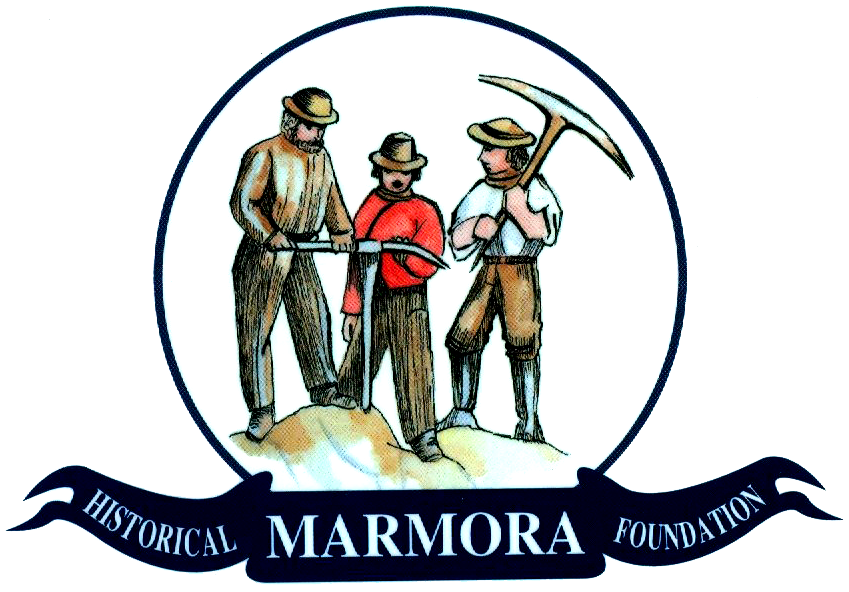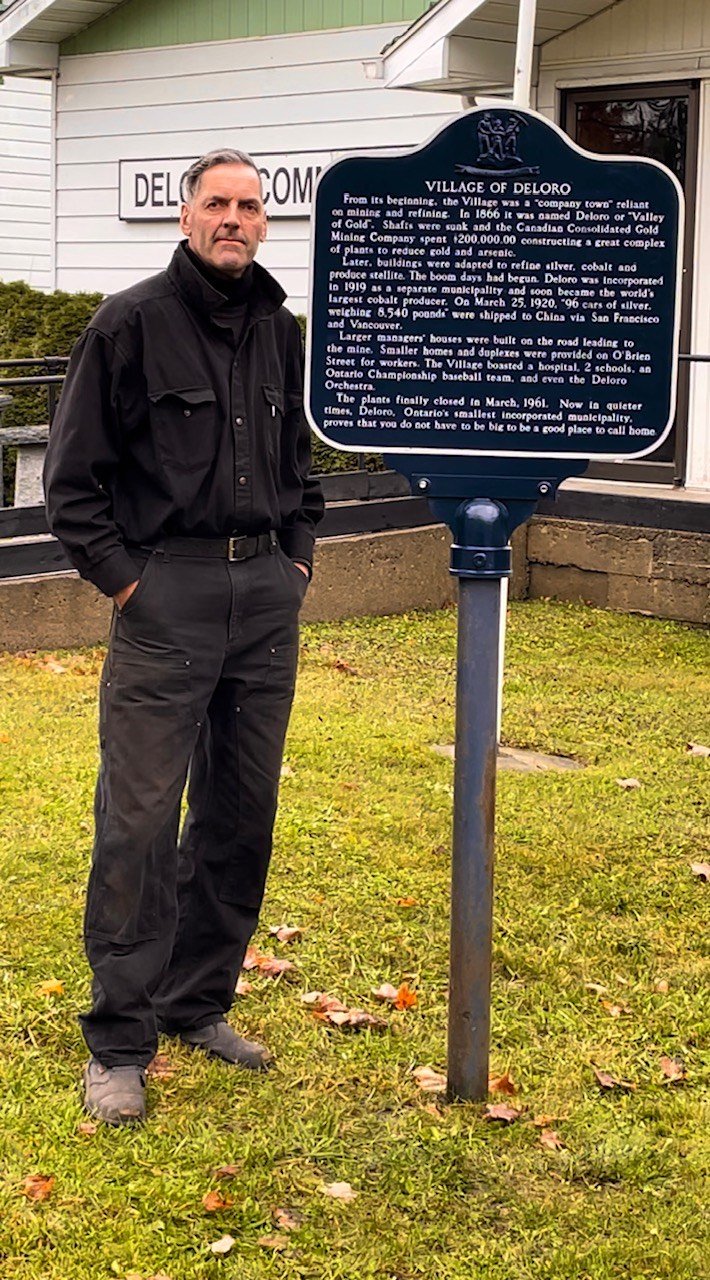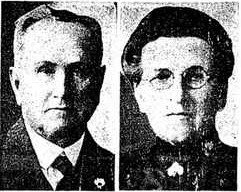THE TEMPERANCE MOVEMENT IN MARMORA
The temperance movement was a social and political campaign of the 19th and early 20th centuries, advocating moderation or total abstinence from alcohol, prompted by the belief that drink was responsible for many of society’s ills. The mass movement was international in scope.
Around 1848, the Sons of Temperance lodge, a fraternal and prohibitionist society, reached Canada from the United States. Other such lodges were the Royal Templars of Temperance and the International Order of Good Templars. The most important temperance society for women was the Woman's Christian Temperance Union, an American group whose Canadian counterpart was founded in 1874 by Letitia Youmans of Picton, Ontario, as one of the few organizations through which women could play a political role. (Canadian Encyclopedia)
Banning Alcohol by Vote
Jurisdiction over the liquor trade was shared by governments. The provinces could prohibit retail sale, while the federal government could ban manufacturing of alcohol and retail, wholesale and interprovincial trade. However, governments at neither level were enthusiastic about prohibition, since it would cause loss of tax revenue and party support. Both levels put forward compromise legislation known as "local option," a power granted to local governments to hold popular votes to create laws on contentious issues in their areas. The process was enshrined in the Canada Temperance Act of 1878, which gave local governments the right to hold votes to ban the sale of alcohol. A side effect was to give prohibitionists political experience, through organizing local-option and referenda campaigns. Prohibitionists secured a major victory in 1900 when Prince Edward Island outlawed the retail sale of alcohol throughout the province. Canadian Encyclopedia
THE EVIL ROAD OF DRINK
Continuing the pressure with fear tactics, the following magazine story points out the downfall of a family is a result of excessive alcohol consumption, decrying the evils of alcohol. Highlighted by this story was the concern that moderate alcohol consumption easily leads to "scene 7" which is why abstinence became an increasingly dominant concern for temperance advocates.
Scene 1 - The bottle is brought out for the first time. The husband induces his wife "just to take a drop"
Scene 2 - He is discharged from his employment for drunkeness. They pawn their clothes to supply the bottle.
scene 3 - An execution sweeps off the greater part of their furniture. They comfort themselves with the bottle.
Scene 4 - Unable to obtain employment, they are driven by poverty into the streets to beg, and by this means they still supply the bottle.
sCENE 5 - cOLD, MISERY AND WANT DESTROY THEIR YOUNGEST CHILD, tHEY CONSOLE THEMSELVES WITH THE BOTTLE
sCENE 6 - FEARFUL QUARRELS AND BRUTAL VIOLENCE ARE THE NATURAL CONSEQUENCES OF THE FREQUENT USE OF THE BOTTLE.
SCENE 7 - tHE HUSBANDIN A STATE OF FURIOUS DRUNKENESS, KILLS HIS WIFE WITH THE INSTRUMENT OF THEIR MISERY
BEER NOW ON SALE HERE
Beer first went on sale in Marmora under the new Regulations on Tuesday afternoon. The former bar room and the sample room at the back have been made into one large beverage room at the Royal Hotel. Business was brisk , but there was no rush like there has been in some places.
A few indulged in more than they were able to carry and walk and act naturally, but there was no serious disturbance. Law enforcement officers should see that the Regulations are strictly enforced and that drunkenness in public is not allowed. The law has not been changed in regard to persons being intoxicated in a public place and it should not be tolerated.Unfortunately the poison that is being sold now as beer causes intoxication much more quickly than beer or ale made from barley malt or hops, such as was sold years ago, and the after effects are much worse. July 26, 1934
1934 A VERY GOOD YEAR
Yesterday the Ontario Government brought in its amendments to the Liquor Control Act by which beer and wine will be on sale in hotels, certain restaurants, clubs, etc. Under the proposed amendments a hotel, club or authorized restaurant will be permitted to sell wine or beer by the glass with meals in the dining room. Hotels will also be allowed to establish a refreshment room where beer alone may be sold by the glass and where meals need not be served. The privilege would also be extended to Veterans' and labor union clubs.
It is also intimated that a permit will not be necessary for the purchase of beer or wine. The advertising of beer, wine and whiskey in newspapers, magazines or by radio will be permitted. since the O.T.A. first came into force in Ontario it has been illegal to advertise any alcoholic beverage in the province. The amendments to the Act are to come into force after the next election, provided the Government is returned to power.
At a joint conference of the opposition members of the Legislature it was decided to acquiesce in the Act and thus prevent it from being made an election issue. Opposition may be made to accept some details of the proposed legislation, but the principle of the bill will be accepted.
March 22, 1934
SIGNING THE PLEDGE OF ABSTINENCE
In Dec. of 1875, Mr. Hugh Anderson was convinced to sign a Pledge of Abstinence. Unfortunately, or perhaps as a result of, he died three months later in March, 1876.
One professor at Colgate University points out "One of the most intriguing aspects of the temperance movement is the range of modes of rhetoric they employed: sermons, mass meetings, pledges, plays, pamphlets, scientific articles, newspaper ads, and visuals. ....... The moral frame of their argument, as well as the use of fear tactics, is readily apparent."
A WW1 DELORO SOLDIER HAD AN OPINION......
It was largely the return of the soldiers that would make the continuation of Prohibition untenable. At one time our government
had considered forbidding alcohol at the war front. A young military driver from Deloro wrote to his friends at the Deloro company,
"It is certainly a funny experience going up the roads with shells bursting around you. It kinds of makes you wonder where the next one is going to drop and then when it's all over, we get an issue of rum."
"If some of the suckers that are advocating the stoppage of rum to us were out all night in the rain and cold, exposed to shell fire and no dry rags to put on when they got in, they would soon change their minds," concluded
H.S. Buchanan. .
When the soldiers came home, they were no longer of a mind to be told what to do all the time. Boys had become men, and the men
rightly felt capable of deciding whether to have a drink or not. Liquor Prohibition inevitably gave way to Liquor Control. On October 20, 1920, Ontarians voted to
dismantle Prohibition; voted out Sir William Hearst and voted in a bunch of farmers organized into a new party called the United
Farmers of Ontario. People were concerned not only about alcohol, but also about the collapse of the family. And why shouldn't they be! Why, by November of that year the
Senate, who alone could grant a divorce in Canada, had received 63 petitions.
Luckily nine-tenths of them were said to be from people in Toronto!
In March 1918, the Federal government passed an order-in-council that prohibited the manufacture, importation, and transportation of alcohol into Ontario and other provinces where purchase was illegal. Nonetheless, Ontarians could still acquire alcohol from doctors offices and drugstores. In 1920 alone, Ontario doctors wrote more than 650,000 prescriptions for alcohol.
DELORO & TEMPERANCE OCT. 1919
SO WHAT HAPPENED IN MARMORA ON REFERENDUM DAY April 18, 1921?
Marmora has the rather doubtful honor of being about the only municipality in this part of Ontario where a majority of the voters are friends of booze. The majorities in the various towns and villages around were as follows:
- Marmora 26 wet majority
- Stirling 275 dry majority
- Madoc 260 dry majority
- Tweed 136 dry majority
- Bancroft 171 dry majority
- Campbellford 461 dry majority
- Norwood 282 dry majority
- Havelock 240 dry majority
- Warkworth 248 dry majority
While we have been unable to get the detailed vote for Marmora and Lake townships, the majority for prohibition was large, one poll showing 68 to 2. Rawdon township had a dry majority of 734 and Prince Edward County went dry by over 5000.
Belleville and Peterborough also showed a dry majority. The returns to date show a dry majority for the Province of 160,000.
Deloro also went wet this time by a few votes, which was quite a change from the last Referendum.
Marmora Herald April 28, 1921
It is stated that the orders from Ontario will take the whole stock of bottled liquors held by the liquor dealers of the Province of Quebec previous to May1st. Some of the largest dealers estimate that the total shipments for the month of April will amount to nearly $10,000,000.00and at that many orders will not be filled. After the first of May the Quebec government takes over complete control of the sale of intoxicating liquors in that province, so that the importation into Ontario will largely cease after that date.
Marmora Herald April 28, 1921
With Letitia Youmans so close to home to spread the word, the voices of the Marmora prohibitionists remained steady and persistent.
Marmora Herald April 2, 1914
"The time seems to have arrived at last when the citizens of the village will no longer quietly submit to conditions as they have existed at the St. James Hotel for the past two or three years.
When it was learned that the proprietor had again made application for a renewal of his license and there was a probability it would be granted, a petition against granting the license for another year was at once put in circulation and it has been so largely signed that the Commissioners will hardly dare go against public sentiment so strongly expressed."
The Marmora Herald regularly reported criminal events involving liquor:
1915 - the Clerk, acting on instructions from Council, submitted a list of names to the Justices of the Peace. Wm. Bonter and H.R. Pearce requesting that the proper steps be taken to have them placed on the forbidden list. A number of names from the township were also submitted.
Summons were issued to the parties named and Court was held on March 4th. Previous to the sitting of the Court, a number personally went to the magistrates and expressed their willingness to be placed on the list as a means of helping them to overcome temptation. A number objected to being placed on the list and the objections of one or two men were accepted by the magistrates. In other cases it was considered in the interests of all concerned to have the names placed on the forbidden list.
Sept. 21, 1916 Marmora Herald
OCT. 26, 1916 - POLICE COURTThe first case tried in Marmora under the Ontario Temperance Act was presided over by Magistrates Wm. Bonter and B. C. Hubbell on Tuesday afternoon. Ed. Feeney and Wm Baurord, who are employed at Deloro were charged, under the Act, with being intoxicated in a public place. They were both found guilty and fined $10,00 each and costs.
1919 - "On Tuesday evening Magistrates B. C. Hubbell and Wm. Banter presided at a Court held for the purposes of hearing five charges for the infraction of the Ontario Temperance Act."
1921- "One hundred and fifty boxes of whiskey, eleven of them containing case goods, and the rest one gallon jugs, were seized by Liquor License Inspectors Connor and Naphin and Provincial Constable Ward in the fair little marble village yesterday."
1931- "Charles H. Blakley and WaIter Francis have had a gorgeous week. They have succeeded in getting themselves arrested twice in the same week on liquor charges, which is no mean feat and have spent two nights in the lock- up, which is not so pleasant.
For more details on these crimes, click here
BEER BY THE GLASS
Beer is now on sale in the beverage rooms of most standard hotels, except in municipalities which were under local option when the O.T.A. went into force. Stirling, Tweed, Havelock, Norwood and a number of other Villages in this part of the Province come under the local option restrictions and it will be necessary to repeal the by-laws in such places by a two thirds majority of the votes cast. There does not appear to be a great rush to the new beverage rooms in the hotels according to reliable reports.
The price of 10 cents per glass and the fact that any person served with beer must be seated at a table and remain seated until the beer is consumed, together with other regulations, are expected to have a restraining influence on the demand for the beverage.
On the other hand many claim the fact beer may be obtained by the glass will have considerable effect in cutting down the amount of hard liquor consumed. If the Government would make it illegal to use the so called chemicals in the manufacture of beer and allow only barley or other grains to be used the evils resulting from the drinking of beer would be greatly lessened.
August 7, 1934
VISITED THE ROYAL HOTEL
While the Royal Hotel beverage room was visited by quite a number yesterday there was no disturbance and no drunken men were in evidence, which is very different to what is happening in many places. It is hoped that conditions of affairs will continue. In quite a number of places a strong public sentiment has been aroused against the new law, owing to the fact the regulations are not being obeyed and numerous drunks are appearing in public. .A few consumed too much here on Tuesday, but yesterday were much improved.
August 2, 1934

































